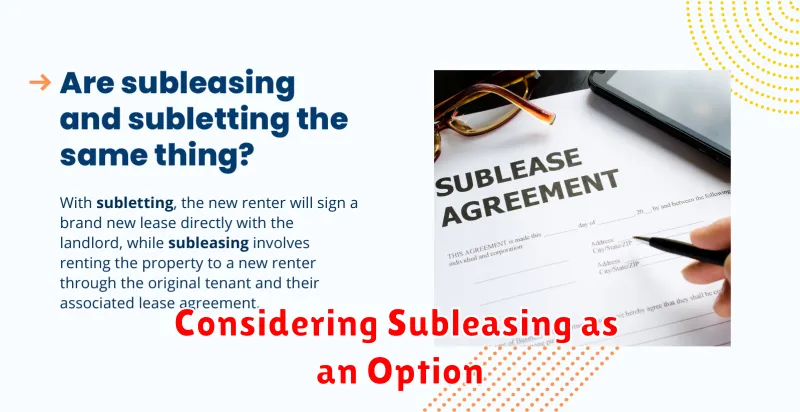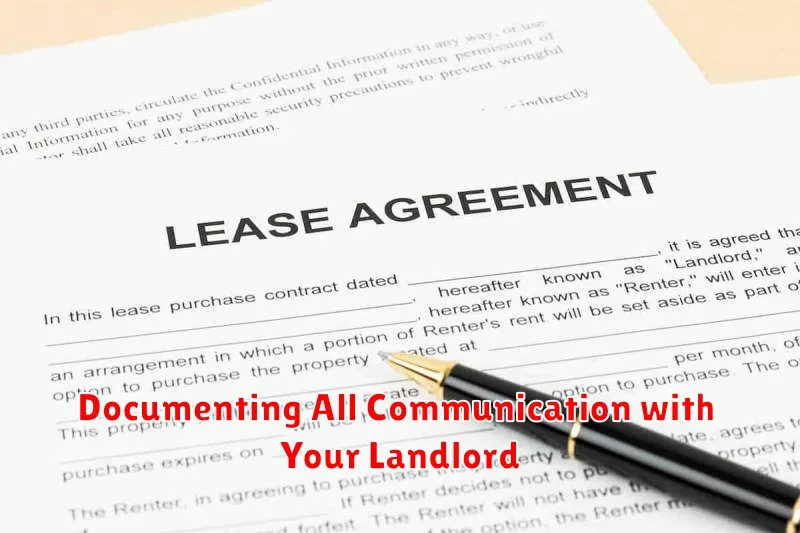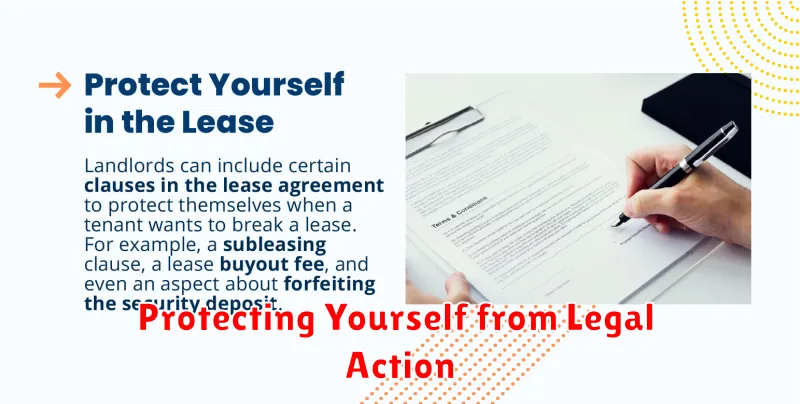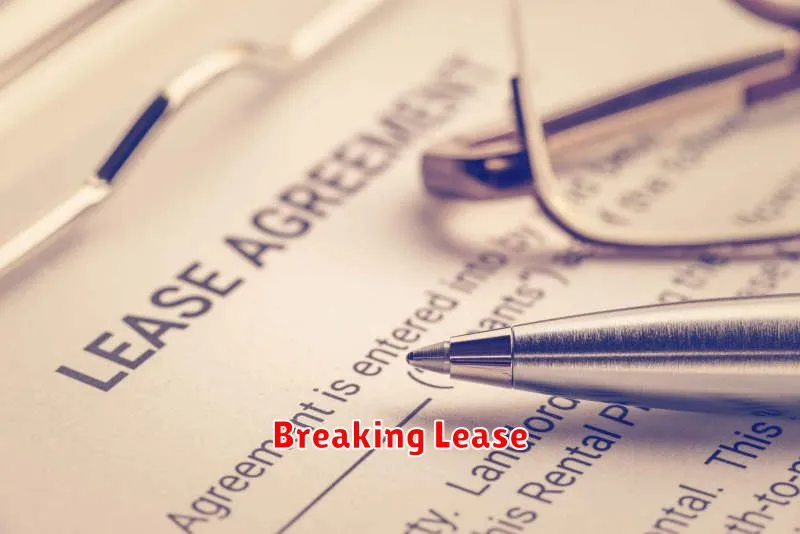Are you facing a situation where you need to move out of your rental property before your lease expires? Breaking a lease can be a stressful and costly experience, but it’s not always unavoidable. Understanding your rights and obligations as a tenant, as well as the potential consequences, is crucial. This comprehensive guide will provide you with essential information on breaking a lease early, including the reasons for early termination, the legal implications, and the steps involved. Whether you’re considering a move for personal reasons, unexpected circumstances, or simply a change of heart, this article will equip you with the knowledge to navigate this process effectively and minimize potential financial burdens.
Understanding the Implications of Breaking a Lease
Breaking a lease can be a stressful and costly decision. Landlords have the right to pursue legal action to recoup their losses when a tenant breaks a lease. This often results in the tenant being responsible for paying the remaining rent for the duration of the lease, as well as any additional fees and legal costs. This can be a significant financial burden, especially for those who are already struggling financially.
Beyond financial repercussions, breaking a lease can also damage your rental history and potentially impact your ability to secure housing in the future. Landlords often check your rental history before approving applications, and a broken lease will be a red flag. It’s important to carefully consider all of the possible implications before making the decision to break a lease.
Reviewing Your Lease Agreement for Early Termination Clauses
Before you even think about breaking your lease, you need to understand the terms of your lease agreement. Lease agreements typically contain clauses that outline the circumstances under which you can terminate your lease early and the penalties associated with doing so. These clauses vary widely, so it’s crucial to read yours carefully.
Some common reasons for early termination that may be outlined in your lease agreement include:
- Military relocation: Many leases allow tenants to break their lease without penalty if they are transferred by the military.
- Domestic violence: Some states require landlords to allow tenants to break their lease if they are victims of domestic violence.
- Landlord’s breach of contract: If the landlord fails to meet their obligations under the lease agreement, such as providing a habitable living space, you may have grounds to terminate your lease.
- Unforeseen circumstances: Some lease agreements include provisions for early termination in the event of unforeseen circumstances, such as job loss or a medical emergency.
If you’re considering breaking your lease, it’s important to carefully review these clauses to determine if you have a legitimate reason to do so. If you do, you’ll need to follow the procedures outlined in your lease agreement to ensure you’re not subject to penalties.
Additionally, if you have a lease that was not signed by both the landlord and the tenant or if the lease agreement doesn’t address early termination, you might have more options available to you. Consulting with a legal professional can help you understand your rights and responsibilities in this situation.
Remember, breaking a lease early can have serious financial consequences. Understanding the terms of your lease agreement is the first step in making an informed decision about whether or not breaking your lease is the right choice for you.
Negotiating with Your Landlord
Breaking a lease early can be a stressful situation, but it’s important to remember that you have some leverage when negotiating with your landlord. Here are a few key tips to keep in mind:
Be upfront and honest: Explain your situation to your landlord as clearly as possible. They are more likely to be understanding and willing to work with you if they know why you need to break the lease. If you are facing financial difficulties, consider offering a detailed explanation of your situation, including any relevant documentation.
Offer a solution: Don’t just ask to be let out of the lease without offering any solutions. You could propose finding a suitable replacement tenant to take over your lease, paying a portion of the remaining rent, or even offering a lump sum payment to cover their losses.
Be prepared to compromise: Negotiating is all about finding a solution that works for both parties. Be open to compromise and willing to discuss different options.
Put everything in writing: Once you reach an agreement with your landlord, be sure to put everything in writing and have it signed by both parties. This will protect you legally and help avoid any future misunderstandings.
Consider seeking legal advice: If you’re struggling to negotiate with your landlord or if the situation is complex, it’s a good idea to seek legal advice from a qualified attorney.
Finding a Qualified Replacement Tenant
If you’re breaking your lease early, you’ll likely be responsible for finding a qualified replacement tenant. This means someone who meets your landlord’s criteria and can sign a new lease. Your landlord may have specific requirements for a replacement tenant, such as a credit score minimum or income level. Make sure you understand these requirements before you start looking for a replacement.
The best way to find a qualified replacement tenant is to advertise the unit. You can post an ad online, in local newspapers, or on bulletin boards in your community. Be sure to include all of the relevant information about the unit, such as the rent, the square footage, and the amenities. You may also want to mention that you’re looking for a replacement tenant because you’re breaking your lease early. This will help you attract potential tenants who are willing to sign a new lease.
Once you’ve received applications from potential tenants, you’ll need to screen them. This involves checking their credit history, employment history, and rental history. You should also conduct a background check to ensure that they are not a danger to your landlord or other tenants. If you’re not comfortable doing this yourself, you can hire a professional screening service.
Once you’ve found a qualified replacement tenant, you’ll need to have them sign a new lease with your landlord. Make sure that the lease is properly executed and that both you and your landlord have copies. Once the lease is signed, you’ll be released from your lease obligation and your landlord will no longer be able to hold you responsible for the remaining rent.
Considering Subleasing as an Option

If you need to break your lease early but are worried about the financial consequences, subleasing might be an option worth considering. Subleasing involves finding a qualified tenant to take over your remaining lease obligations. This can help mitigate financial losses, but it’s important to understand the process and potential challenges.
Here’s a breakdown of the pros and cons of subleasing:
- Pros:
- Potentially reduces financial penalties for breaking your lease.
- Can help you find a replacement tenant quickly.
- Cons:
- Finding a qualified subtenant can be difficult and time-consuming.
- You may still be held responsible for the subtenant’s actions and any unpaid rent.
- Your landlord may have restrictions on subleasing or require their approval.
Before considering subleasing, consult your lease agreement carefully to understand the landlord’s policies on subleasing. If subleasing is permitted, make sure to have a strong sublease agreement in place that clearly outlines the terms and responsibilities of both parties. This will help protect you from potential legal issues and financial losses.
Exploring Legal Grounds for Lease Termination
Breaking a lease agreement early can result in significant financial penalties, making it crucial to understand the legal grounds for early termination. While landlords generally prefer tenants to fulfill the entire lease term, there are circumstances where breaking a lease without incurring penalties is possible.
Here are some common legal grounds for lease termination:
1. Landlord Breach of Contract: If a landlord fails to fulfill their obligations under the lease agreement, such as providing habitable living conditions or maintaining essential services, tenants may have grounds to terminate the lease. Examples include failure to repair a leaking roof, lack of heating, or infestation.
2. Constructive Eviction: When a landlord’s actions render the rental unit uninhabitable, even without directly evicting the tenant, it constitutes constructive eviction. This could involve severe noise disturbances, lack of essential utilities, or significant repairs that make the unit unusable. Tenants can legally terminate the lease in such cases.
3. Military Deployment: Active military personnel may be able to break a lease due to deployment. The Servicemembers Civil Relief Act (SCRA) provides protections for service members, including the right to terminate a lease if they receive permanent change of station (PCS) orders.
4. Domestic Violence: In some jurisdictions, victims of domestic violence can break a lease early if they are in danger. Laws may allow tenants to terminate the lease without penalty and seek relocation assistance.
5. Unlawful Discrimination: If a landlord discriminates against a tenant based on protected characteristics like race, religion, or disability, the tenant may have grounds to break the lease. This is considered a violation of fair housing laws.
It’s crucial to understand that lease termination based on these grounds often requires legal documentation and proper notice to the landlord. Consulting with a lawyer or legal professional can ensure that the termination process is handled correctly and protects the tenant’s rights.
Documenting All Communication with Your Landlord

It’s important to document all communication with your landlord, especially when breaking a lease early. This documentation can be crucial if you need to make a claim or defend yourself against a claim from your landlord.
Here are some tips for documenting your communication with your landlord:
- Keep copies of all correspondence. This includes emails, letters, text messages, and any other form of communication.
- Date and time stamp your documents. This will help you keep track of the order of events.
- Be clear and concise in your communication. This will help to avoid any misunderstandings.
- Be polite and professional. This will help to maintain a positive relationship with your landlord.
- Keep your communication in writing. This will provide you with a record of your communication, even if your landlord denies receiving your communication.
By following these tips, you can help to protect yourself if you need to break your lease early.
Understanding Your Financial Obligations
When you sign a lease, you’re entering into a legally binding contract. This means you agree to pay rent for the entire duration of the lease, regardless of whether you live in the property. Breaking a lease can have serious financial consequences, so it’s essential to understand your obligations before taking such a step.
The most significant financial obligation you face when breaking a lease is the early termination fee. This fee is typically outlined in your lease agreement and can be a substantial amount, often equivalent to one or more months’ rent. You might also be responsible for lost rent, meaning you’ll have to pay the landlord for the remaining period of the lease if they can’t find a new tenant to occupy the property. This cost can add up quickly, especially if you have a longer lease term.
It’s crucial to remember that breaking a lease can also impact your credit score. Landlords often report lease violations to credit reporting agencies, which can make it challenging to secure future housing or loans. Therefore, breaking a lease should be considered a last resort and only after exploring all other options.
Protecting Yourself from Legal Action

Breaking a lease early can have legal consequences, so it’s crucial to protect yourself. While the exact process varies depending on your state and lease agreement, here are some general tips:
Communicate with your landlord: The first step is to inform your landlord in writing of your intention to break the lease. Be clear about your reasons and your desired departure date.
Negotiate a release: Your landlord may be willing to release you from the lease agreement, especially if they can quickly find a new tenant. Be prepared to offer a compromise, such as paying a portion of the remaining rent or finding a replacement tenant.
Understand your rights: Some states have laws that protect tenants from excessive penalties for breaking a lease. Research your state’s laws and consult with a legal professional if necessary.
Document everything: Keep copies of all communication, including emails, letters, and text messages. This documentation will be essential if a dispute arises.
Be prepared for consequences: Even if you follow all legal procedures, your landlord may still pursue legal action. Be prepared for potential financial penalties, such as unpaid rent or damages.
By taking these steps, you can minimize the legal risks associated with breaking a lease early. However, it’s always advisable to consult with a legal professional for personalized advice regarding your specific situation.
Mitigating Potential Financial Losses
Breaking a lease early can have significant financial consequences. Landlords are entitled to compensation for lost rent and potential costs associated with finding a new tenant. To minimize these losses, it’s crucial to understand your lease agreement and explore potential options for reducing financial penalties.
Negotiating with your landlord is often the first step. Be prepared to present a compelling reason for breaking the lease, such as a job relocation or unforeseen circumstances. Offering to pay a lump sum payment, helping find a replacement tenant, or subletting the property can increase your chances of reaching a mutually acceptable agreement.
Consider consulting with a legal professional to understand your rights and obligations under the lease agreement. They can advise on potential legal options, such as seeking a release from the lease based on landlord breaches.
Remember that understanding your lease agreement and exploring all available options can help you mitigate potential financial losses associated with breaking a lease early.
Moving Out and Forwarding Your Address
When you break a lease, it’s essential to officially notify your landlord of your move-out date and your new address. This ensures they can communicate with you about any remaining lease obligations and avoid unnecessary issues. You can typically do this by sending a certified letter with return receipt requested. This provides proof that you’ve sent the notice and ensures your landlord receives it.
Furthermore, forwarding your mail to your new address is crucial. This step prevents important documents, such as bills and legal notices, from getting lost or sent to the wrong location. Many postal services offer mail forwarding options, which can be activated online or at your local post office. You can typically set a timeframe for how long you want your mail forwarded, ensuring a seamless transition.
It’s important to remember that changing your address with other entities, such as banks, credit card companies, and utilities, is also essential. You’ll need to update your contact information with these institutions to avoid any disruptions in services or communication.
Breaking your lease can be a stressful experience, but it’s important to remember that you’re not alone. Many people find themselves in situations where they need to move out of their apartment before the end of their lease. Finding a new place to live can be challenging, but it’s not impossible.
Here are a few tips for finding a new apartment after breaking your lease:
- Start looking for a new apartment as soon as you know you’ll need to break your lease. This will give you more time to find the right place and to negotiate a good deal.
- Be honest with potential landlords about your situation. Tell them that you’re breaking a lease and why. Most landlords will understand and be willing to work with you.
- Be prepared to pay a security deposit and first month’s rent upfront. Some landlords may require you to pay additional fees, such as a lease-breaking fee, so be sure to ask about any potential fees before you sign a lease.
Once you’ve found a new apartment, you’ll need to move out of your old one. Make sure to clean your apartment thoroughly and return the keys to your landlord. You should also send a written notice to your landlord letting them know when you’ll be moving out.
Breaking your lease can be a stressful experience, but it’s important to remember that you’re not alone. With a little planning and effort, you can find a new apartment and move on with your life.

